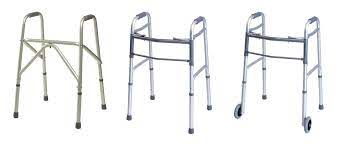With Age, one might start experiencing difficulties exerting their body weight on one or both legs and this may hinder mobility.This is the time when a walker or any mobility aid object is highly recommended.. Additionally, a walker can be useful after a hip placement or knee surgery, during which time a person might be experiencing a challenge with mobility, and a walker is the best option to provide support and independence.
As if not enough, people suffering from balance or mobility issues need a walker so that they can manage to move around with ease. Whether outdoors or indoors, assistance, a walker can facilitate freedom and movement for those in need. According to the Harvard University’s Joint Center for Housing report, about 15 years from now, 17 million United States households will include at least one mobility-challenged senior member. Let’s look at some important features to look at when choosing walkers for seniors.
Portability and weight of the walker
While walkers are generally considered lighter than wheelchairs, there is still variance in terms of weight for various types of walkers in the market. For the elderly, it’s generally recommended that use a lightweight walker that supports the freedom of mobility rather than impeding it. Whereas you can use a heavier walker to operate, it will be inconvenient if you plan to travel with it. Lightweight walkers are generally easier to store, carry around and fold.
Walker width
The most suitable width of a walker is one that allows you to move with ease through all your doorways. This includes public bathroom doors. Always ensure the walker you are going to choose is going to work for you both indoors and outdoors. However, this consideration is irrelevant if you are planning to primarily use your walker for exclusively outdoor movements. Furthermore, your hips ought to comfortably fit in the walker.
Weight capacity
Walkers normally have weight limits. While a standard rated walker supports weight up to 300 lbs, which is appropriate for most of the users, some users might weigh more than that and require something different. Always ensure you look at the weight capacity of the walker you are getting, as using a device that does not support your weight can be extremely dangerous. For higher weights, a bariatric model is highly recommended.
Foldability
Most walkers are easy to fold while others are not. If you’re a traveling enthusiast and want a walker that can be folded and kept in a compatible place in a vehicle or a plane, go for one that serves this purpose. Additionally, depending on your car or home’s space, get the most suitable walker that fits in the designated space.
Adjustability
Adjustability comes in handy when talking about the height of the handles of your walker. A good walker should be able to be adjusted so that it can appropriately fit and support. For instance, a 6-foot-2-inch adult cannot use a similar height as a 5-foot person. Regardless of your shoe height, choose a walker with adjustable and comfortable handles so that you won’t have to strain when using it.
Price
Is your walker worth it, considering its price? Most quality walkers cost between $80 and $200. Unless you need specialized walkers, it can cost more. Importantly, if you have Medicare Part B coverage, purchases may be covered, provided it’s considered a medical necessity.
Final word
A walker serves its purpose if it perfectly meets the measurements and. Individuals with fractures and bone conditions specifically require well-fitted walkers and so do the elderly with mobility issues. When purchasing one for yourself or a loved one, don’t just pay for it. It’s important to inspect and ensure it satisfies the needs of the intended user.
